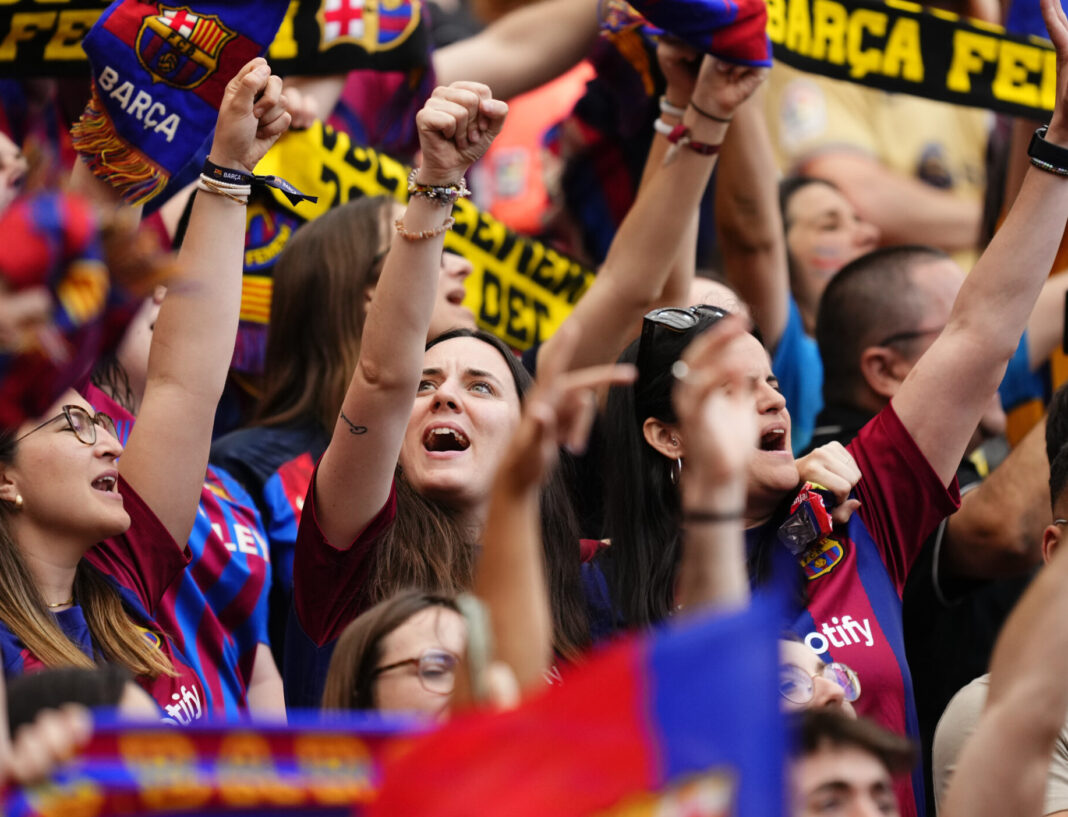Barcelona – In the heart of Europe’s most prestigious competition, where dreams of glory often meet the crushing weight of defeat, a deeper, more troubling narrative emerged. FC Barcelona, a club beloved by millions, faces the heavy hand of UEFA’s disciplinary committee once again. This time, it’s not for a loss on the pitch, but for the actions of a few whose hateful behavior echoed through the stands. UEFA, in its unwavering stance against racism, has fined the Catalan giants $10,000 and prohibited ticket sales to visiting fans for their next Champions League match—a consequence that lingers far beyond monetary value. But as this sanction settles, we are reminded of a truth that transcends football: there is a cost to silence in the face of injustice.
A Reckoning in Football: FC Barcelona’s New Sanction
Football, that universal language spoken in stadiums around the world, also serves as a reflection of the human condition—where hope and hate can occupy the same space. On the evening of September 19, 2024, at Monaco’s Estadio Luis II, the latter overshadowed the former as racist chants and gestures erupted from a section of Barcelona supporters. UEFA, bound by Article 14(2) of its disciplinary code, acted swiftly, issuing a $10,000 fine and placing a ban on the sale of tickets to Barça’s traveling fans for the next UEFA Champions League match.
But this isn’t Barcelona’s first encounter with UEFA sanctions. Just a few months prior, in the quarterfinal clash against Paris Saint-Germain, similar misconduct took place. Back then, the fine was $28,000—almost three times as severe—following Nazi salutes and other racially charged actions. And yet, the punishment seems to grow heavier each time, as though UEFA is reminding us all that the weight of such actions will only deepen unless a change is made.
The Consequences of Racist Behavior in European Football
The cost of this fine extends far beyond financial loss for FC Barcelona. It’s a wound to the reputation of a club that stands as one of football’s global icons. For those fans who had already purchased tickets for the upcoming November 6th clash against Red Star Belgrade, refunds will be offered, but what remains is a stark reality: actions carry consequences.
The language of football has always been about unity. It transcends borders, races, and languages. But when racism rears its head, it tears at the very fabric of what the game stands for. “The charges against Barça relate to racism and other discriminatory conduct,” UEFA stated, reminding the world that this isn’t just about one club or one nation—this is about football itself.
In a sport where the roar of the crowd can lift a team to glory, silence too must have its place. By banning Barcelona’s away fans from future matches, UEFA is sending a message to all supporters: hate has no place here.
FC Barcelona’s Response and the Path Forward
The Barcelona faithful may be reeling, but the club itself remains resolute in its stance against discrimination. “We will comply with and enforce this sanction,” the club announced, signaling a commitment to align with UEFA’s decision. Yet behind the press releases, behind the procedural compliance, there lies a deeper question: How does a club known for its values and its global outreach combat such a recurring problem?
The club has admitted that fan behavior is an issue—one that has led to “repeated sanctions, both domestically and internationally.” But the time for admission alone has passed. FC Barcelona, echoing the words of their own statutes, emphasized the importance of upholding the Universal Declaration of Human Rights, vowing to “reinforce current measures” to ensure these incidents don’t become a recurring theme. This, they say, is their commitment to justice.
Still, the battle is not just fought on the administrative side. It is in the hearts and minds of the supporters who fill the stands. Football is more than a game; it is a reflection of society. The question for Barcelona—and for football as a whole—is whether the sport can lead by example, proving that love and unity can triumph over the ugliness of hate.
Football, Racism, and UEFA’s Role in Change
In recent years, UEFA has strengthened its disciplinary measures against racism in football. Article 14(2) of the UEFA Disciplinary Regulations allows the organization to impose strict penalties on clubs whose fans are involved in racist incidents. These actions—though sometimes criticized for being too lenient or inconsistent—send a clear message: there are consequences to every chant, every gesture, every hateful word.
UEFA’s stance is not just about punishing clubs like Barcelona, but about setting a precedent across Europe. Whether in the grand stadiums of Paris or the smaller grounds of Belgrade, the behavior of fans matters. Each sanction, each fine, is a step toward creating a football culture where discrimination is no longer tolerated.
But football, much like life, requires more than just reactive measures. It calls for proactivity. As FC Barcelona promises to “reinforce” its stance against hate, one can only hope that the club’s actions inspire a broader cultural shift—both within the club and across football. It is a challenge that not only tests the spirit of the game but the very soul of those who call themselves supporters.
Conclusion: A Game Larger Than Football
Football has always been a microcosm of society—a place where joy and pain, victory and defeat play out on the world’s stage. But today, it also serves as a battleground for change. FC Barcelona’s sanction is not just a reminder of the consequences of racism; it is a call to action for us all.
In the silence of an empty away section at Red Star Belgrade, we must hear something louder: the need for accountability, for respect, and for unity. Football, like life, is about more than winning. It is about showing up with grace, lifting others, and understanding that our words—whether sung in a stadium or spoken in conversation—carry weight.


